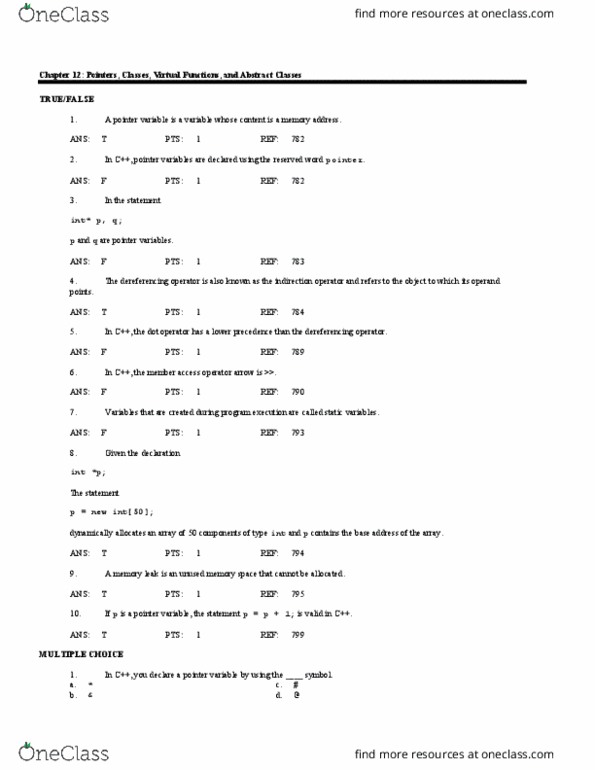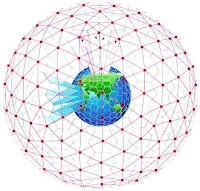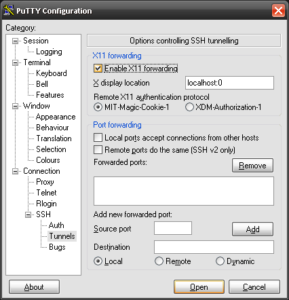
The operand of the indirection operator should be a pointer and the result of the operation is value addressed by the operand (pointer). It is a unary operator that is used in the declaration of the pointer and accesses a value indirectly, through a pointer. Indirection operator or Dereference Operator ( * ) These unary operators are indirection operator ( * ) and address of operator ( &).
Indirection requires pointer operand how to#
I think before understanding how to use the pointers, we should know the two important unary operators. Let’s see the below-mentioned example to understand the declaration of a pointer. Every pointer has the data types (pre-defined or user-defined) and names followed by an asterisk (*). The Declaration of a pointer is very important because at the time of declaration you define the capability of the pointer.

When we have used a pointer to store the address in the memory then using the dereferencing techniques we can also get the value from the address which is stored by the pointer. In other words, we can say, a pointer is used to reference a location in the memory. C Pointers Introduction:Ī pointer is similar to a variable but the difference is that pointers are store the address of a location in memory and the variable stores the value. If you want complete information about the pointers you read my other post “ Complete information of pointers in C/C++“. This pointers introduction post gives only small information on pointers. In this blog post, I am giving a small introduction to C Pointers. A pointer is a very important concept of C language, so you should have good knowledge of pointer.
installing GCC-4.You can not imagine C language without the C pointers. C++ passing std::unique_ptr as an argument. Is it possible to use a lambda function inside of a vector's constructor?. uuid_generate_random (libuuid) on solaris. Automatically determine if user-defined function is equivalent to the implicit one. Check calling convention of pointer-to-function type. Certain case of value-initialization in C++03 doesn't call constructor?. c++ googlemocks : Getting a stack trace of an uninitialized call.  Distinguish a 32bit from a 64bit PE object file generated by cl.exe (Visual Studio C++). Filter out only one contour in OpenCV C/C++. Generic wrappers for templates: optimization opportunities. Problems with OpenGL when running QT Creator. out-of-line definition of 'function' does not match any declaration in 'Class'. Most efficient tree structure for what I'm trying to do. How can I reliably detect the version of clang at preprocessing time?. Calculating the mean for a set of numbers while neglecting outliers. Order of evaluation of elements in list-initialization. Deducing the type of an integer by its compiletime value. Where's the proper (resource handling) Rule of Zero?. How do I typedef a function pointer with the C++11 using syntax?. Why do function pointer definitions work with any number of ampersands '&' or asterisks '*'?. Are there benefits of passing by pointer over passing by reference in C++?. "unpacking" a tuple to call a matching function pointer. How does delete "know" the size of the operand array?. Passing capturing lambda as function pointer. What does "dereferencing" a pointer mean?. Why should I use a pointer rather than the object itself?. What is a smart pointer and when should I use one?. What are the differences between a pointer variable and a reference variable?. error C2109: subscript requires array or pointer type. C++ pointer arithmetic "lvalue required as left operand of assignment" error. An issue about pointer type that is expected as the type of an operand of the operator prefix++ (also for postfix ++). How to optimize the layers of pointer indirection. Is performing indirection from a pointer acquired from converting an integer value definitely UB?. Getting raw pointer from shared_ptr to pass it to function that requires raw. If the first operand of an additive expression is convertible to both pointer and integer, which conversion is chosen?. Can std::remove_pointer be used to remove all indirection from pointer type?. LLVM: Creating a CallInst with a null pointer operand. Is there a smart pointer type that requires multiple owners?.
Distinguish a 32bit from a 64bit PE object file generated by cl.exe (Visual Studio C++). Filter out only one contour in OpenCV C/C++. Generic wrappers for templates: optimization opportunities. Problems with OpenGL when running QT Creator. out-of-line definition of 'function' does not match any declaration in 'Class'. Most efficient tree structure for what I'm trying to do. How can I reliably detect the version of clang at preprocessing time?. Calculating the mean for a set of numbers while neglecting outliers. Order of evaluation of elements in list-initialization. Deducing the type of an integer by its compiletime value. Where's the proper (resource handling) Rule of Zero?. How do I typedef a function pointer with the C++11 using syntax?. Why do function pointer definitions work with any number of ampersands '&' or asterisks '*'?. Are there benefits of passing by pointer over passing by reference in C++?. "unpacking" a tuple to call a matching function pointer. How does delete "know" the size of the operand array?. Passing capturing lambda as function pointer. What does "dereferencing" a pointer mean?. Why should I use a pointer rather than the object itself?. What is a smart pointer and when should I use one?. What are the differences between a pointer variable and a reference variable?. error C2109: subscript requires array or pointer type. C++ pointer arithmetic "lvalue required as left operand of assignment" error. An issue about pointer type that is expected as the type of an operand of the operator prefix++ (also for postfix ++). How to optimize the layers of pointer indirection. Is performing indirection from a pointer acquired from converting an integer value definitely UB?. Getting raw pointer from shared_ptr to pass it to function that requires raw. If the first operand of an additive expression is convertible to both pointer and integer, which conversion is chosen?. Can std::remove_pointer be used to remove all indirection from pointer type?. LLVM: Creating a CallInst with a null pointer operand. Is there a smart pointer type that requires multiple owners?. 
How much does pointer indirection affect efficiency?. Why can't I dereference a pointer to an object that's an array-element using the indirection operator?. Why does taking a member function pointer value requires class name qualification even from inside of the class?. Can't resolve Error: indirection requires pointer operand ('int' invalid).







 0 kommentar(er)
0 kommentar(er)
